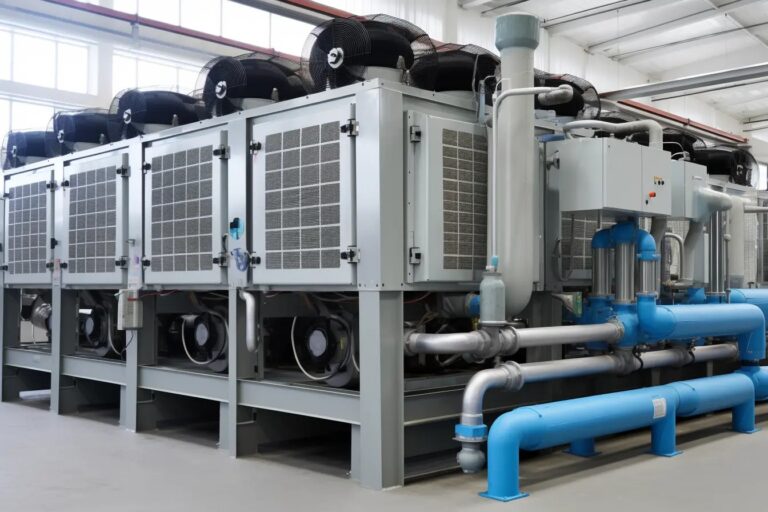Industrial refrigeration equipment plays a pivotal role in ensuring the smooth operation of many industries. From food processing to chemical manufacturing, it supports the effective cooling and preservation of products, ensuring that businesses meet regulatory requirements and maintain quality standards.
Understanding the various types of refrigeration systems and their applications helps businesses optimize their cooling processes, reduce energy consumption, and improve overall efficiency.
Types of industrial refrigeration systems
Industrial refrigeration systems come in a variety of designs, each tailored to specific needs and industries. The primary types include:
- Ammonia refrigeration systems
Ammonia-based systems are among the most commonly used for large-scale refrigeration. Known for their efficiency and reliability, these systems use ammonia as a refrigerant, which is both cost-effective and environmentally friendly. They are often employed in industries like food processing, cold storage, and petrochemical manufacturing, where large quantities of cooling are required. - HFC and CO2 refrigeration systems
Hydrofluorocarbons (HFCs) and carbon dioxide (CO2) are also widely used in industrial refrigeration. HFC systems offer lower environmental impact compared to older refrigerants, while CO2 systems have gained popularity due to their natural refrigerant properties. These systems are ideal for smaller-scale operations or applications that require a more eco-friendly solution. - Water-cooled vs. air-cooled systems
Water-cooled refrigeration systems are known for their high efficiency and ability to handle large cooling loads. However, they require access to a water source, which can be limiting in certain regions. On the other hand, air-cooled systems do not depend on a water source and are typically easier to install and maintain. These systems are often used in locations where water access is restricted.
Applications of Industrial refrigeration equipment
The applications of industrial refrigeration are vast, affecting nearly every sector of the economy. Here are a few key areas where refrigeration systems are indispensable:
- Food processing and storage
One of the most significant uses of industrial refrigeration is in the food industry. Refrigeration is necessary to extend the shelf life of perishable items, such as meat, dairy, fruits, and vegetables. It helps preserve freshness, prevent spoilage, and ensure food safety. Without reliable refrigeration, food products could quickly become unsafe for consumption. - Pharmaceutical manufacturing
The pharmaceutical industry also relies heavily on industrial refrigeration equipment to store drugs, vaccines, and other sensitive products. Many medications require strict temperature control to maintain their efficacy. Refrigeration systems in this sector must adhere to stringent regulations to ensure that products remain safe and effective. - Chemical processing
Refrigeration is widely used in chemical manufacturing, particularly in processes that require cooling to control reaction temperatures. Certain chemicals need to be stored at low temperatures to maintain their stability. Efficient refrigeration systems are crucial in preventing hazardous conditions that could lead to accidents or compromised product quality.
Energy efficiency and sustainability
With rising energy costs and increased awareness of environmental concerns, energy efficiency has become a primary focus in the design and operation of industrial refrigeration systems. Modern systems are built to minimize energy consumption while maintaining optimal performance. By adopting advanced technologies like variable speed drives, heat recovery systems, and low-GWP (global warming potential) refrigerants, businesses can reduce their carbon footprint and lower operational costs.
Maintenance and safety considerations
Regular maintenance is necessary to keep industrial refrigeration systems running at peak performance. Scheduled inspections, cleaning, and part replacements help avoid costly breakdowns and extend the lifespan of the equipment. It’s also important to follow safety protocols, as refrigeration systems often use chemicals and gases that can be hazardous if not handled properly.
In addition, operators should be trained to identify potential issues, such as refrigerant leaks or electrical malfunctions, and take immediate corrective actions. Regular monitoring of system performance can help prevent accidents and ensure the safety of personnel and the surrounding environment.
Key role
Industrial refrigeration equipment plays a key role in many industries, from food processing to chemical manufacturing. By choosing the right system, maintaining it properly, and optimizing energy usage, businesses can improve their operations, reduce costs, and meet industry standards. With a focus on efficiency, sustainability, and safety, industrial refrigeration continues to support the backbone of modern manufacturing.


Comments are closed.